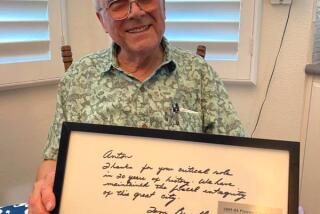Rudy De Leon dies at 85; Hollenbeck Youth Center grew from his boxing program
Rudy De Leon was commander of the LAPD’s Hollenbeck Division when he decided to try to curb street-gang problems by starting a boxing club for youths in the basement of the Boyle Heights police station.
It was a radical notion in 1973, he later recalled, but the athletic pursuit had helped shape his teenage years. As one of the city’s first Latino police captains -- and an amateur boxer -- he “just knew” that the predominantly Latino community served by the Eastside station would benefit as well.
The boxing program grew into the Hollenbeck Youth Center, which De Leon helped establish in the late 1970s in an old police station. Greatly expanded by 1998, the center has been credited with helping thousands of at-risk youths through an extensive array of programs and activities.
De Leon died Monday at a care facility in Rancho Palos Verdes of complications related to Alzheimer’s disease, his family said. He was 85.
After serving in the Navy during World War II, De Leon was working in a bakery when he read an article in The Times about athletes who had become Los Angeles Police Department officers.
“All the athletes I knew were good guys,” De Leon told The Times in 1994, “so I went for it.”
When De Leon entered the police academy in 1947, he was one of only three minority students in a class of 135, according to a 2003 Los Angeles Police Historical Society newsletter.
As a rookie, he was assigned to what was then a new detail -- an anti-gang unit -- and worked mainly in the Chavez Ravine area.
By 1970, De Leon was the commander of Hollenbeck and had “the desire to do something for the community,” said Daniel Hernandez, executive director of the youth center. “Because of Rudy’s passion for boxing, he allowed his officers to become more active in the community, to share and exert their energies . . . for the kids.”
One of the local youths who benefited from De Leon’s boxing program was Paul Gonzales, who occasionally sneaked into the station’s back door for a boxing lesson and later won a gold medal at the 1984 Los Angeles Olympics.
Rudolph Vincent De Leon was born March 31, 1924, at home in Watts to Jesus and Ermila, immigrants from Mexico.
Growing up in Los Angeles, De Leon sold his mother’s homemade tamales door-to-door with his two brothers. He also had two sisters.
Playing on the street, he learned to box and engaged in his first amateur fight when he was about 16.
“My dad always attributed boxing to helping him. He was somewhat shy, but boxing helped build his confidence, and he always believed that it could help others,” said his son, Rudy De Leon II, who serves in the LAPD’s mounted unit.
In the Navy, the senior De Leon continued to box and was a pharmacist’s mate in Guam. He also provided healthcare aboard a destroyer escort.
When he was a police officer, he taught criminal justice at a number of area colleges. He credited teaching with making it easier for him to pass the exams that helped advance his LAPD career.
Stan Nelson, a retired LAPD detective, told The Times that De Leon “was so charismatic that people who worked for him couldn’t help but strive for a higher level of professionalism.”
After retiring from the LAPD in 1978, De Leon served on the state Board of Prison Terms and in the 1980s was special assistant to then-state Atty. Gen. John Van de Kamp.
In 1994, he became the first ombudsman for the Los Angeles County Sheriff’s Department, troubleshooting and investigating complaints against the department until 2002.
A marathon runner since the early 1960s, De Leon ran his 81st and final marathon when he was 77.
He lived much of his life in Torrance and Lomita with his wife of 59 years, Helen. She died in 2005.
In addition to his son, De Leon is survived by three other children, Cynthia, Regina and Steven; three siblings, Gloria, Jesse and Manual; nine grandchildren; and four great-grandchildren.
A memorial service will be held at 10 a.m. Monday at St. Margaret Mary Church, 25511 Eshelman Ave., Lomita.
Memorial donations may be made to the Los Angeles Police Historical Society, 6045 York Blvd., Los Angeles 90042, or the Los Angeles Police Memorial Foundation at www.lapmf.org.
More to Read
Start your day right
Sign up for Essential California for the L.A. Times biggest news, features and recommendations in your inbox six days a week.
You may occasionally receive promotional content from the Los Angeles Times.







